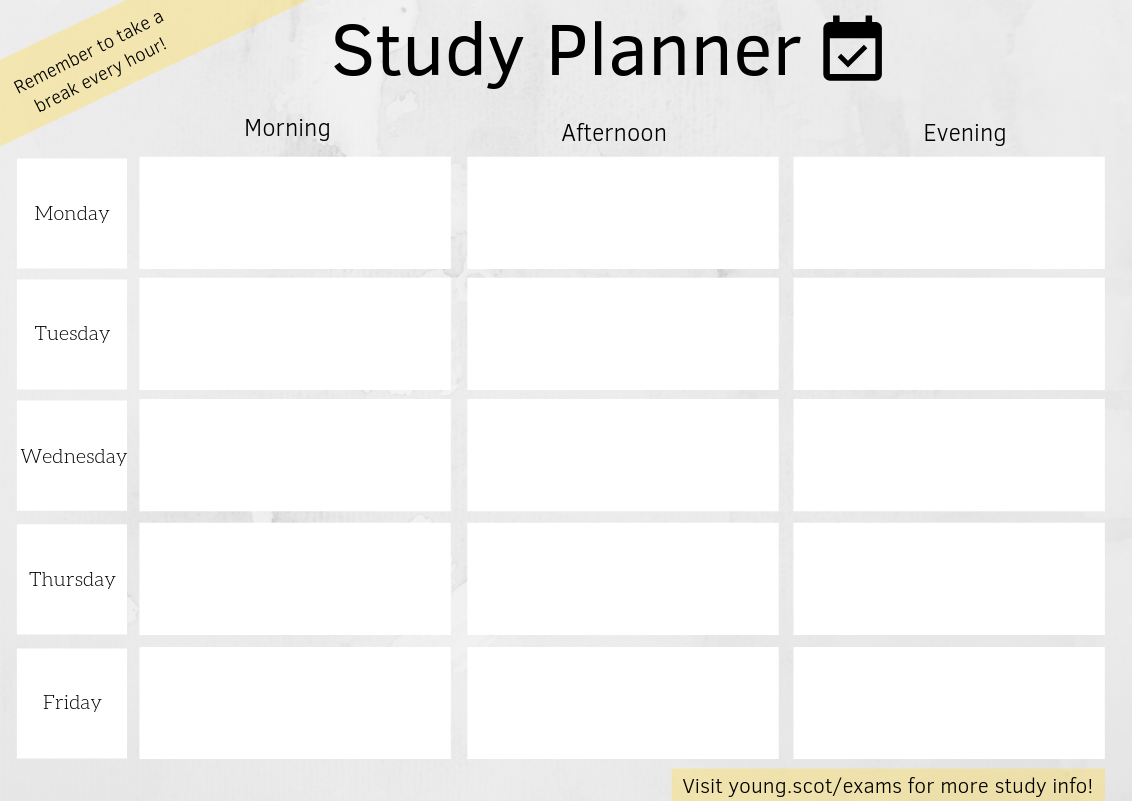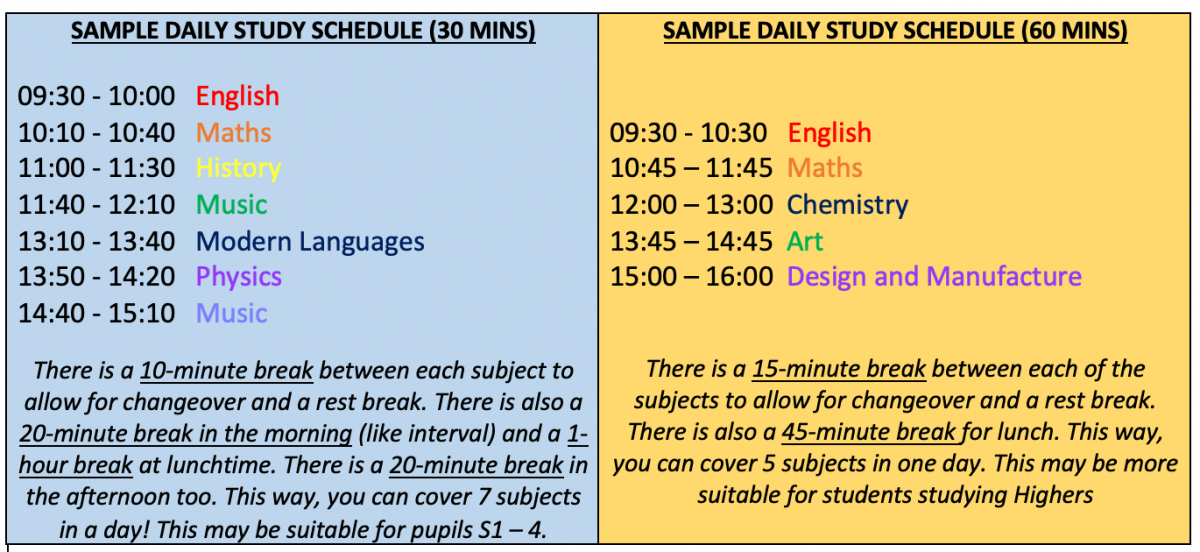Maximising Your Study @ Home!
Are you studying at home and don’t know what to do?
Are you unsure of how to study? Or how to organise your day?
Here are our TOP 5 hints and ideas on how you can best maximise your time working from home and some useful resources to help you!
Step 1: Create a Study Space

While you might not all have a desk at home, it’s important to find a spot in your home that is Quiet, Comfortable and Free of Distractions. That means you should find somewhere where you can sit with your work in front of you and where your focus is on just your work. This could be a desk, dining room table, kitchen table, living room, bedroom.
Get everything you will need for what you are studying. Some examples of this might be:
- Pens
- Pencils
- Notebooks/Jotters
- Class notes
- Post It Notes
- Ruler
- Calculator
- Rubber
It might also be useful to have a clock or timer nearby to keep you to your schedule.
Reduce your distractions by turning off TV and Music (Nope – it doesn’t help you concentrate!) and either put your phone away, or turn it over and on silent so you can’t see any messages! You might also have some snacks nearby to keep motivated!
Step 2 – Create a Study Schedule/Plan
Schedule your day and your week. This will help you make sure that you are covering all your subjects and keep you on track. You can use your timer to make sure you stick to your study plan and tick off what you have done! You can download a study planner like this one by clicking on the link below:
https://young.scot/get-informed/national/get-organised-for-exams-with-our-study-planner

When designing your study plan, it’s important to take into account some of the following advice:
- Chunk your subjects in to small timescales. For example – you may decided to study a subject for 30 minutes before a break, or for an hour. Work out what best suits you for optimum concentration
- Schedule in breaks. This is the time you can have a rest, get up and stretch your legs, look at your phone, watch TV etc. Be strict with your break time too.
- Schedule equal amounts of time for ALL your subjects. Don’t just pick the ones you like! This might help you plan the order of your subjects. For example, a subject which you find difficult could then be followed by a subject that you particularly enjoy, or find a bit easier.
Below, is two examples of a daily schedule. The example on the left is more suited for pupils in S1 – 4 where you spend 30 minutes on each subject. This gives you much more variation and a reduced amount of time you need to concentrate for. As you can see, breaks are built in after every subject and for lunch and interval. This is the same in the second example, on the right, but subjects are less but for a longer time – 60 minutes. This might suit a pupil in S5-6 for example.

Step 3 – Plan Ahead
There is no good using your 30/60 minutes of study time thinking about what you are going to do. Take some time in the morning (before your first session), or the night before, planning out what tasks you have to do that day/that week. Create a to-do list!

You can download a To-Do List template here: To-Do List
When you plan your day/week you should remember to check the following:
- Show My Homework
- Class Glow Team
- Class Notes/Homework Diary from being in school
Each of these will help you to know what tasks you have to complete that day/week. When you are in school, teachers will give you tasks to complete at home. If there isn’t anything outstanding, then you should STILL stick to your study plan but use some of the online resources that are available. These might include:
- Subject Specific Websites (takes you to dept pages)
- BBC Bitesize BGE (Levels 1 – 3)
- BBC Bitesize N4
- BBC Bitesize N5
- BBC Bitesize Higher
- SCHOLAR (S3 – 6 pupils will get a log in)
- SQA Past Papers
- Study Groups (set up a study group online with your friends and study together!)
It may be useful to follow our department pages on Twitter as links to resources can also be found on these pages. You can check out our twitter handles on each department page.
It is also important that you know how to contact your class teacher. Make sure you have their email address or know how to contact them on Teams, to be able to ask for help if you need it.
Step 4 – Reward Yourself
It’s hard to study at home. There’s lots of distractions and lots of other factors that contribute to making it difficult. But it is a sign of maturity and ownership of your own learning, when you can take responsibility to follow your study plan. It’s very important that you reward yourself for your hard work! Here’s some ideas on how to do this:
- Close your work down after your last session of the day and go and do something you enjoy – play your computer games, listen to your music, face time a friend.
- Tick things off your to-do list! Highlight them or cross them out when they are done – it makes you feel accomplished!
- Share what you’ve done with your parents/carer. They will be really proud of you
- Relax in the evenings after you’ve worked
- At the end of each day or week, treat yourself to your favourite sweet/chocolate if you’ve worked hard!
Recognise that there will always be good days and bad days and allow yourself the time to recover or slow down on the bad days. If you are finding that you are having more bad days than good, get in touch with your teachers, your Pupils Support teacher, or your year head and we will try to help. But if you try to follow the advice given above, studying becomes a little easier to manage.


